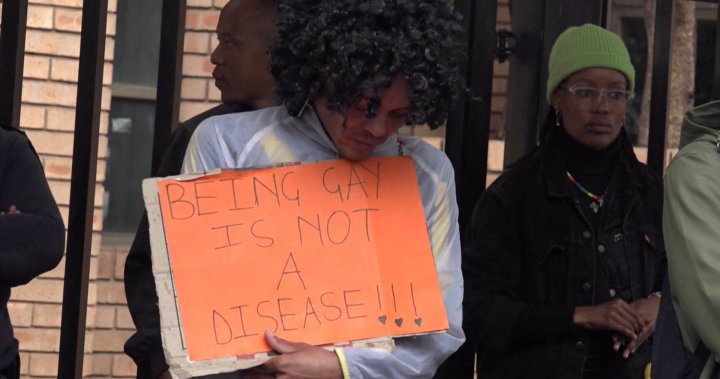‘The fear we are living with’: LGBTQ2 Ugandans in hiding after new anti-homosexuality law passed | Globalnews.ca
It is being discussed discreetly in quiet corners of loud rooms, among hushed voices and shifty eyes scanning for any unintended ears. Many in Uganda are talking about the country’s new law but few feel comfortable speaking about it publicly out of fear for their safety.
The east African nation passed what is being considered some of the harshest anti-homosexuality legislation the world has ever seen. It has sparked outrage with many western nations calling it ‘draconian’ and a ‘gross violation of human rights.’
Those in Uganda’s already criminalized and largely outcasted LGBTQ2 community are being pushed even further into hiding, but some are determined to do whatever it takes to fight back.
‘Kinyagiro,’ a Ugandan mother and a professional, is bisexual. Global News is protecting her real name for her safety. She agreed to be interviewed in the dark of night on video conference, but roughly two minutes into the conversation she abruptly changes the subject.
“A security person just showed up and they just paused so I’m just going to walk away, oh my God,” she said breathless, picking up the stride in her step.
“I got freaked out ’cause that’s the kind of thing that’s happening right now,” said Kinyagiro once she felt safe enough to call back. “You’re not sure, you don’t know who is going to be picked up or for what reason,”
A bisexual Ugandan mother spoke with Global News via video conference about her concerns with her homeland’s anti-homosexuality legislation.
Same-sex relations in Uganda have always been a crime carrying a potential life sentence. The new law calls for the death penalty for LGBTQ2 people convicted of having sex with a minor or if the accused has an illness like HIV/AIDS. Those found promoting homosexuality could face 20 years in jail.
Kinyagiro says many in the community are in a perpetual state of anguish.
“That’s the fear we are living with, people are being attacked on the street, yes and being arrested,” she said ” Those who are not being attacked, they have this anxiety. You don’t know when your moment is going to come, where to do things, who to speak to all of that.
“You can’t go to work, you can’t go to the market. You have to constantly pretend and watch your back.”
It’s echoed in the words of another man, who Global News met in person. He is gay but has been forced to spend the majority of his public life pretending to be someone he is not.
“You are lying to yourself everyday that you are living here. I suffer from insomnia and depression,” he said.
“I have to think constantly how I act. Am I felt to be disgusting? Am I loveable? Can I do this again tomorrow,” he said in a quiet voice on a warm Ugandan evening.
Frank Mugisha, one of Uganda’s most well-known and outspoken advocates, was flying to Canada on May 31 when the law passed. He remains at the forefront of the fight against the law and is determined to protect his community at all cost. He said he had a lengthy sit-down conversation with Prime Minister Justin Trudeau.
“We are already seeing anti-gay legislation coming up in other countries: Malawi, Zambia, Burundi, Ghana,” said Mugisha. “The spillover is real so the urgency of stopping the anti-gay legislation and fighting against it is urgent right now.”
Frank Mugisha speaks with Global News about his concerns with Uganda’s anti-homosexuality legislation.
Mugisha has already been arrested and he says he’s also been violated. Despite the risks he is returning home to Uganda.
“Definitely the risk of getting arrested, the risk of getting violated, the verbal threats, physical threats I’ve gotten and bullying on social media is worth the fight,” said Mugisha.
The Stephen Lewis Foundation in Canada is working hard to help secure safe housing for those in the community in Uganada. They also hosted some members of Uganda’s LGBTQ2 community in Toronto during Pride month as special guests. But Meg French, executive director of the Stephen Lewis Foundation, said this issue can’t be forgotten when Pride month ends.
“This is the lives of people that are at risk,” said French. “So the Canadian government needs to be working with the U.N., with the World Bank, with other governments around the world to say this is absolutely unacceptable.”
Uganda’s government insists the new law is a reflection of the people it represents who want to preserve what it calls ‘traditional family values.’
“Whatever views people are putting up in parliament are the views of the people of Uganda,” said Businge Emmanual, a government representative. “We really want the international community to look at the bigger picture. What really is the biggest problem Ugandans have?”
“Western countries are more interested in that bill. We have very many problems.”
But some business owners are worried about the economic impacts the new law will have.
“Tour operators and hotel owners have had cancellations from foreign visitors because of this new law,” said one Ugandan business owner who didn’t want to be named. “We are concerned NGOs (non-governmental organizations) will start closing.
“There is a trickle down affect that impacts everyone. First we have COVID, then Ebola and now this. It’s helping nobody.”
A similar law was overturned by the constitutional court in Uganda in 2014 and petitions against this new law have already been filed, one led by Frank Mugisha. Both he and others like Kiyangiro are hopeful their brave efforts will prevail.
© 2023 Global News, a division of Corus Entertainment Inc.
For all the latest world News Click Here


